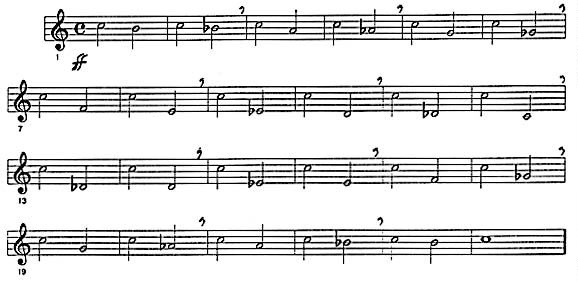Editor's note: The following excerpt is written by David Bilger and used with his permission. It describes an exercise for improving power and endurance that Mr. Bilger learned from Renold Schilke. For a very worthwhile and full discussion of many other facets of trumpet practice, preparation, and performance, check out the whole master class from which parts of this was taken. Go to Notes on Technique. Mr. Bilger currently is Principal Trumpet of the Philadelphia Orchestra, and was previously Principal of the Dallas Symphony. He currently teaches at The Curtis Institute of Music and Temple University in Philadelphia.
Endurance:
As is the case with range, endurance is also a combination of many of the topics we have already touched upon, and will benefit from many of the same etudes. The two other things that will most quickly improve endurance are efficiency and loud practice.
1. Efficiency is a necessity for any brass player. Playing the trumpet is extremely physical, and efficient playing will reduce the demands on the player. Efficiency can be achieved by taking care of the following:
- Always use a good volume of air, and high air speed
- Always play with your embouchure set
- Do not use excessive pressure
- Practice upper body relaxation
- Always think about what you are doing while you play
2. Loud practice is another part of trumpet playing that is often overlooked. Remember, when practicing at loud dynamic levels, always keep your sound from distorting, and never cause yourself physical pain. Do not use excessive pressure! Orchestral excerpts are a good source of loud material, as are the Brandt Orchestral Etudes. Perhaps the best resource for loud playing are the Schilke Power Exercises. Playing 5 minutes of these a day will be all you need to develop the necessary strength for increased endurance.
Mr. Bilger writes specifically about this exercise:
I had the pleasure and honor of working with Mr. Schilke for a week at the Banff Centre in 1980 when he was hanging out with the Canadian Brass who were on the faculty there. During that week he showed me the power exercises that I outlined in my master class materials. I have all my students do them!
They should be played at quarter note = 60, and with huge quick breaths after every four half notes. And most importantly, they should be played as loud as the player can control, with attention being paid to stability of sound and pitch, as well as dynamic. They are designed for developing an "orchestral" sound, but are of use to all players who want to develop additional power in their playing.
Transpose into different keys.

© 1999 - 2006 by James F.
Donaldson
All rights reserved